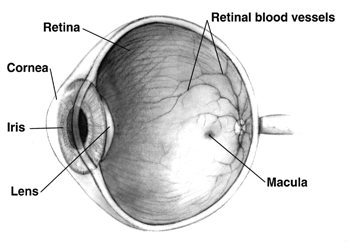New Peptide Could Improve Treatment for Vision-Threatening Disease

Johns Hopkins researchers report that a new peptide holds promise for improving treatment for degenerative retinal diseases, such as age-related macular degeneration, diabetic macular edema and diabetic retinopathy. These vascular diseases often result in central vision loss as blood vessels grow into tissues at the back of the eye, where such growth should not occur.
The study, published Jan. 18 in Science Translational Medicine, shows that the injectable peptide may more strongly suppress abnormal blood vessel growth and leakage in the eye, cause regression of established abnormal vessels, and may last longer when compared to current treatments. If proven effective in humans, this could mean that patients need only a few needle injections to the eye per year, instead of the monthly injections that are the current standard of care.
Aflibercept is the standard treatment for these retinal diseases and specifically targets one protein, vascular endothelial growth factor (VEGF), which signals for the production of these new problematic blood vessels. Treatments are administered by injecting drugs that bind VEGF directly into the eye. “The production of VEGF is chronic, so repeated injections every four to six weeks is needed in most patients, often indefinitely,” says Peter Campochiaro, M.D., the George S. and Dolores D. Eccles Professor of Ophthalmology at the Johns Hopkins University School of Medicine.
Jordan Green, Ph.D., associate professor of biomedical engineering at the Johns Hopkins University School of Medicine, says, “These frequent visits can become a burden for patients due to the discomfort and small risk of each injection and, for some patients, because their vision is not good enough to drive to appointments.”
Using animal models of human disease, the researchers tested whether the peptide, named AXT107 after its discovery in the laboratory of Aleksander S. Popel, Ph.D., professor of biomedical engineering at the Johns Hopkins University School of Medicine, was more effective at suppressing vascularization than currently used treatments.
To do this, researchers ruptured tissues at the back of mice’s eyes to induce vascular growth. The mice were then separated into four treatment groups. One received the AXT107 peptide, another received aflibercept, a third control group received an inactive peptide, and a fourth group received both AXT107 and aflibercept. The researchers found that the AXT107 peptide and aflibercept significantly suppressed new vessel growth, and the combination of AXT107 and aflibercept caused significantly more suppression than either alone.
Excerpted from Johns Hopkins Medicine.
